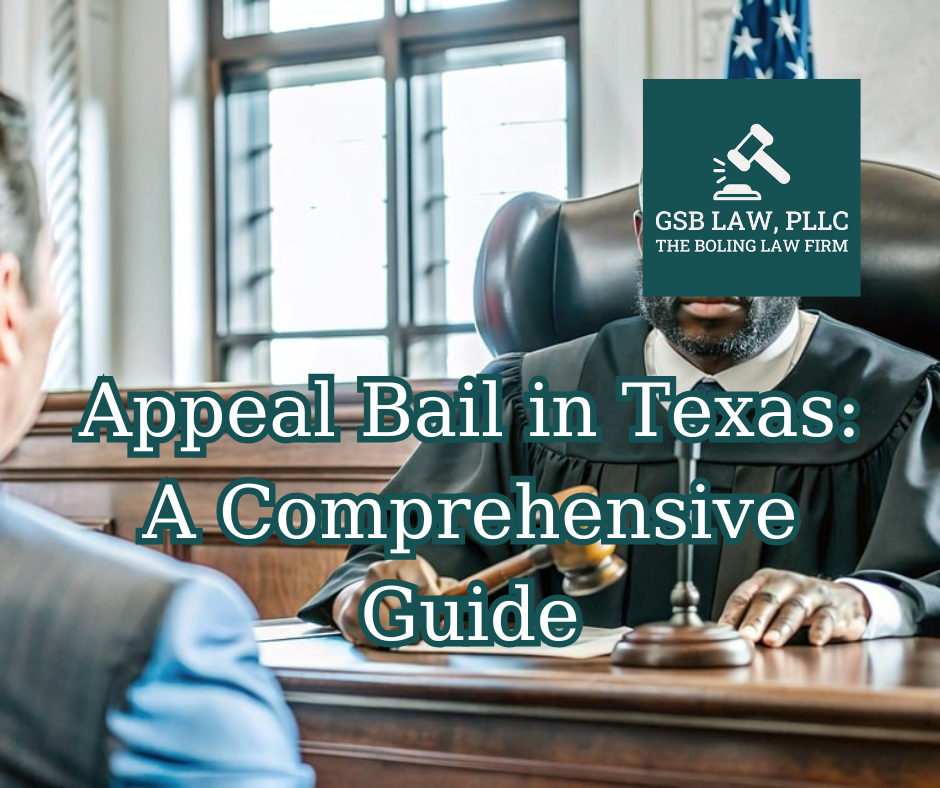
Facing criminal charges and navigating the court system in Texas can feel overwhelming, especially when considering options like appeal bail. This critical legal process allows convicted individuals to remain free while pursuing an appeal. If you or someone you know is facing criminal charges in Denton, Collin, or Tarrant counties, this guide will provide the essential information you need about appeal bail: what it is, who qualifies, common conditions, and what to expect during this process.
In Local News:
Man arrested after shooting arrows at people in Denton Walmart
Denton County Sheriff Tracy Murphree secures third term
What is Appeal Bail in Texas?
Appeal bail, also known as bail pending appeal, is a court-ordered arrangement that allows someone convicted of a crime to stay out of jail while appealing their case. Essentially, it ensures that a person doesn’t have to serve their sentence immediately while waiting for the appeals court to review their conviction or sentence.
Appeals can take months or even years to resolve, and without appeal bail, a defendant may spend significant time in jail even if their conviction is later overturned. Appeal bail is not guaranteed; it requires meeting specific conditions and approval by the court.
Who Qualifies for Appeal Bail?
Eligibility Requirements
Eligibility for appeal bail depends on several factors. Not everyone convicted of a crime can receive it, and Texas courts follow strict guidelines when deciding who qualifies.
- Non-Capital Crimes:
Appeal bail is not available for capital offenses, such as capital murder, which carry the most severe penalties, including life imprisonment or the death penalty. - Low Flight Risk:
The court will consider whether the defendant is likely to flee if granted bail. Factors like stable employment, family ties, and residence in the community weigh heavily in these decisions. - Meritorious Appeals:
To qualify for appeal bail, the court must believe the appeal has merit. In other words, the appeal cannot be frivolous or without a legitimate legal basis. - Compliance with Previous Orders:
Defendants who have followed court orders during their trial, such as attending hearings and adhering to bond conditions, are more likely to qualify.
Why the Court Evaluates Individual Cases
Each defendant’s circumstances are unique. For instance, someone convicted of a first-time non-violent offense may be viewed differently from someone with a lengthy criminal history. Courts in Denton, Collin, and Tarrant counties carefully evaluate the facts of the case, ensuring the decision aligns with public safety and justice.
Common Conditions of Appeal Bail
When a judge grants appeal bail, they typically impose strict conditions to ensure the defendant complies with the court’s expectations. These conditions are designed to protect the community and ensure the defendant’s return for future court proceedings.
Standard Conditions
- Restricted Travel: Defendants often must surrender their passport and may be prohibited from leaving a specific area, such as their county or state.
- Mandatory Check-Ins: Regular check-ins with a probation officer or court-designated authority are usually required.
- Prohibition of Illegal Activity: Defendants must avoid any unlawful behavior or activities.
Financial Obligations
Securing appeal bail often involves posting a bond, which can be paid in cash or through a bail bondsman. The bond amount is usually higher for appeals than for pretrial bail due to the increased risk associated with a convicted defendant.
Understanding Bail Bonds
A bail bond is essentially a financial guarantee that the defendant will appear in court as required. If the defendant fails to show up, the bond may be forfeited, and they could face additional legal consequences. In Texas, a surety bond is a common option, where a bail bondsman posts the bond in exchange for a non-refundable fee, usually 10-20% of the bail amount.
Can Appeal Bail Be Revoked?
Yes, appeal bail is revocable, and courts take violations of bail conditions very seriously. If a defendant fails to comply with the terms of their bail, the court may revoke it, leading to immediate incarceration. Common reasons for revocation include:
- Missing a scheduled court hearing.
- Traveling outside permitted areas without prior approval.
- Engaging in criminal activity or violating laws while out on bail.
Is Appeal Bail Available for Misdemeanors and Felonies?
Misdemeanor Cases
Appeal bail is typically easier to obtain for misdemeanor convictions because these offenses carry less severe penalties. For example, someone convicted of a Class A misdemeanor, such as theft, is more likely to be granted appeal bail compared to someone convicted of a felony.
Felony Cases
In felony cases, appeal bail is harder to secure. Courts are more cautious when dealing with serious offenses like aggravated assault or burglary. However, with strong legal representation, it is possible to demonstrate that the defendant meets the requirements for appeal bail.
What to Expect in Denton, Collin, and Tarrant Counties
Local Court Practices
The courts in Denton, Collin, and Tarrant counties each have unique practices. Some may be more conservative or lenient based on the community’s needs and expectations. An experienced attorney familiar with these local nuances can significantly improve your chances of securing appeal bail.
Filing Deadlines
Timing is critical. Defendants must file for appeal bail shortly after their conviction. Failing to act promptly can reduce the likelihood of approval, as courts prefer cases where the appeal process is clearly underway.
The Importance of Legal Representation
Navigating the appeal bail process can be daunting, especially for individuals unfamiliar with the criminal justice system. Gregory Scott Boling, principal attorney at GSB Law, PLLC, is renowned for his expertise in Texas criminal defense. With extensive experience handling cases in Denton, Collin, and Tarrant counties, his team ensures clients are well-prepared for every stage of the process.
Why Appeal Bail Matters
Protecting Your Rights
Appeal bail provides an opportunity to fight for justice without enduring the hardships of incarceration. It allows defendants to actively participate in their defense, ensuring a fairer process.
Avoiding Premature Penalties
Without appeal bail, defendants may serve part or all of a sentence that could later be overturned on appeal, causing unnecessary hardship.
Conclusion
Appeal bail in Texas is a vital option for those seeking justice while appealing their convictions. By understanding eligibility requirements, common conditions, and the importance of timely action, defendants can navigate this process with greater confidence. If you are facing criminal charges in Denton, Collin, or Tarrant counties, having a skilled attorney like Gregory Scott Boling by your side can make all the difference in securing appeal bail and protecting your future.
FAQs
1. What happens if I violate the conditions of my appeal bail?
Violating bail conditions can result in immediate revocation, leading to incarceration and additional legal consequences.
2. Can I get my bond money back after the appeal process?
Yes, if you comply with all bail conditions and your case is resolved, the court typically refunds the bond amount, excluding any fees paid to a bondsman.
3. How does appeal bail differ from pretrial bail?
Pretrial bail allows release before a trial, while appeal bail applies after a conviction and during the appeals process.
4. What if my appeal is denied?
If your appeal is denied, you must begin serving your sentence immediately unless further appeals are allowed.
5. Can I apply for appeal bail without a lawyer?
While it is possible, having an experienced lawyer greatly increases the chances of securing appeal bail due to the complexity of the process.
